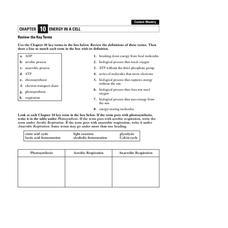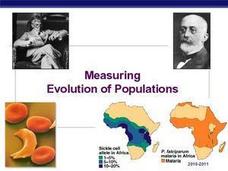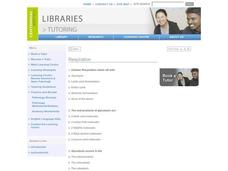Utah Education Network (UEN)
Utah Open Textbook: 7th Grade Science
Physical and biological factors affect everyday living. Scholars explore electromagnetic forces, motion, the rock cycle, and geological changes. They examine cells as the building blocks of life and how organisms reproduce using images...
Curated OER
Study Guide for Chapter 9: Cellular Respiration
In this cellular respiration worksheet, students review the processes of cellular respiration. Students explain, illustrate, label and chart glycolysis, Krebs cycle and Electron transport chain.
Curated OER
Cells
Students are introduced to the life cycle of a cell. In groups, they identify and describe the function of organelles. They compare and contrast the differences and similarities between plant and animal cells as well. They complete a...
Curated OER
Science Reproduction
Students discuss the different stages of mitosis. In this biology instructional activity, students work in pairs as they draw and diagram the stages of cell division. They discuss reproduction using pro, meta, ana and telophase.
Curated OER
Getting Energy to Make ATP
In this cellular energy worksheet, students review the stages of cellular respiration and contrast fermentation with cellular respiration. This worksheet has 6 fill in the blank and 6 short answer questions.
Curated OER
What is an Animal?
In this animal worksheet, students review characteristics of animals including body symmetry, development, and skeletal structure. This worksheet has 3 short answer questions.
Curated OER
The Life Cycle of a Flowering Plant
In this flowering plant worksheet, students will review vocabulary words associated with the life cycle of flowering plants. This worksheet has 7 matching and 3 short answer questions.
Curated OER
Energy in a Cell
In this cell energy worksheet, students will match 8 terms with their definitions relating to the biological processes that create energy in a cell. Then students will match 6 terms as being a part of photosynthesis, aerobic respiration,...
Curated OER
Extensions - Biology Review Unit
Students engage in a variety of activities in order to review a Biology unit. For example, they research the Bird Flu, it's history, how it is spread, what has been done about it, what better options exist for controlling or removing it....
Howard Hughes Medical Institute
Viral DNA Integration
How do reverse transcriptase inhibitors work? Young virologists examine the function of azidothymidine, a drug doctors use to treat HIV patients, during a hands-on modeling activity. Groups create a strand of DNA from an HIV RNA strand...
The New York Times
Sequencing the Stages: Understanding H.I.V. Infection at the Molecular Level
How does HIV operate at the molecular level? Pupils discover the progression from a healthy immune cell to one infected with HIV, watch an animation of the HIV life cycle, and finally identify each of the stages with illustrations on...
Curated OER
Measuring Evolution of Populations
The five agents of evolutionary change are reviewed in this slideshow. Definitions of common terms involved with populations and equilibrium are given, and there are some presentations of Hardy Weinberg equations for common examples of...
Curated OER
Viruses and Bacteria
Reviewing the key terms and ideas from a chapter about viruses and bacteria, this activity helps students to reinforce their knowledge about the makeup and life cycle of a virus. Students answer true/false questions, blanks from a word...
Curated OER
Cell 9 Edited: Meiosis
Student list the steps of mitosis with a brief definition of each stage. Then they begin their study of meiosis. They practice placing the stages of meiosis in order using flashcards depicting the Prophase, Metaphase, Anaphase, and...
Curated OER
Reproduction and Development
In this human reproduction worksheet, students will review the male and female anatomy and the hormones involved in the development towards sexual maturity. Students will also review the events that occur during the three phases of the...
Curated OER
Viruses, Bacteria, Protists, and Fungi
In this viruses, bacteria, protists, and fungi activity, students will review the basic characteristics of each of these groups. Students will complete 7 fill in the blank questions about viruses, 6 true or false questions about...
Curated OER
Human Development: The First Trimester & Developmental Malformations
Students, analyze and discuss cleft lip, cleft palate, anencephaly, spina bifida and septal defects in the heart--well-known malformations that can occur in the first trimester of prenatal devalopment. They play the review game, Fetal...
Curated OER
Respiration
In this cellular respiration learning exercise, students answer 14 multiple choice questions related to aerobic and anaerobic respiration.
Curated OER
Reproductive System
Fifth graders identify and define parts of the reproductive system. In this health instructional activity, the teacher introduces the parts of the reproductive system, then students match body part cards to the corresponding definition...
Atkins
Attack of the Viruses!
Not all viruses are bad, but are all retroviruses groovy? The lesson starts with a detailed presentation before scholars create their own model of a virus. The resource incorporates many worksheets and practice questions to reinforce the...
Curated OER
Cellular Transport
In this cellular transport activity, high schoolers review the process of osmosis and compare passive transport and active transport. This activity has 12 matching questions.
Curated OER
In Vitro Fertilization
A possible option for infertile couples is in-vitro fertilization and implantation. Through this two-part lesson, the class learns about this process by teacher lecture and internet research. A case study is given to read as a take-home...
Curated OER
Reproduction
In this reproduction worksheet, students review the processes involved with sexual reproduction in animals and pollination in plants. This worksheet has 6 fill in the blank, 5 true or false, and 9 short answer questions.
Curated OER
Cnidarians
In this cnidarians worksheet, students will read 4 descriptions and identify each as either the polyp or medusa form of cnidarian. Then students will complete 3 short answer questions about the characteristics of cnidarians. Finally,...

























